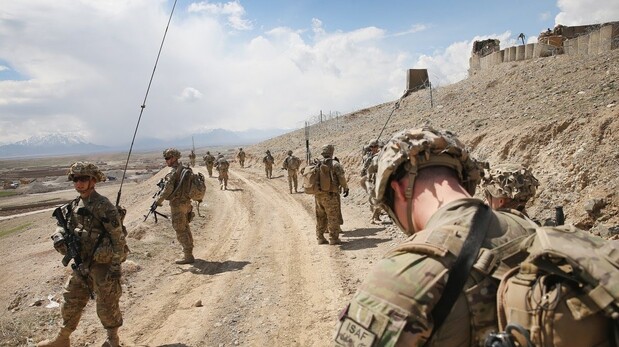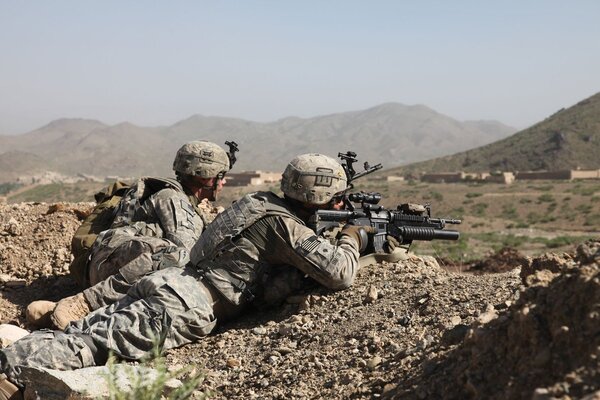Biden to announce withdrawal of US troops from Afghanistan by September 11
President Joe Biden, having concluded there's no military solution to the safety and political problems plaguing Afghanistan and determined to specialize in more pressing national security challenges, will formally announce Wednesday that US troops will withdraw from the country before the 20th anniversary of the 9/11 terror attacks, a senior administration official said.
The withdrawal extends the US troop presence past a May Day deadline set by the Trump administration in an agreement with the Taliban, but only by a matter of months.
Biden has been weighing the choice for months together with his advisers and signaled he didn't believe US troops should remain within the country go the deadline.
The Washington Post was the first to report the news.
The senior administration official said NATO troops would also follow an equivalent withdrawal timeline. US troops may be going to be withdrawn "well before" 9/11, the official said, saying the date was the least possible time when remaining personnel would go away.
The official said the US had communicated to the Taliban "in no uncertain terms" that attacks on US troops during the withdrawal process would be met with retaliation.
But the withdrawal of folks forces comes with risks, as Biden's last two predecessors, Presidents Barack Obama and Donald Trump, tried but were ultimately unable to untangle the US from the war in Afghanistan.
Senior military commanders have advocated keeping US troops within the country and have argued that a premature withdrawal could lead to a collapse of the Afghan government. A US Intelligence Community assessment released Tuesday warned that the Taliban was likely to form gains on the battlefield.
In discussions over the past month, Biden was "adamant" that a hasty withdrawal wasn't viable. But he judged that remaining within the country for much longer didn't reflect the requirements of the present global threat picture. Biden asked for a policy review that might include "genuine realistic options" that might not "sugarcoat" that situation.
The official said that unlike past efforts to line a US withdrawal date, Biden's deadline wasn't conditions-based.
"The President has judged that a conditions-based approach, which is then the approach of the past 20 years, maybe a recipe for staying in Afghanistan forever. then he has concluded that us will complete its drawdown, will remove its forces from Afghanistan before 9/11," the senior official said.
US officials say there are about 2,500 troops in Afghanistan. The US isn't getting to withdraw completely, because the senior administration official said some troops will remain within the country to supply diplomatic security, though the precise number had not yet been decided.
Also, it isn't immediately clear what is going to happen to many hundred US special operations forces there that always work for the CIA on counter-terrorism missions. Those troops aren't publicly acknowledged and aren't a part of the formal calculation of two,500 troops within the country.
Biden's decision split Capitol Hill, with Republican hawks slamming the withdrawal plans as a "grave mistake." Congressional Democrats, meanwhile -- alongside a couple of Republicans -- praised Biden for finally bringing an end to the US war.
The decision would end the longest war in American history
Biden's new 9/11 deadline to withdraw US troops would mark a symbolic end to the longest war in American history: Exactly 20 years after the 9/11, 2001, terrorist attacks that sparked the initial US invasion of Afghanistan.
More than 2,200 US troops have died within the country since 2001 and quite 20,000 are wounded.
The administration official said the objectives of the initial invasion of Afghanistan -- to deliver justice for the 9/11 attacks and disrupt terrorists -- had been achieved "some years ago."
"This isn't 2001. It's 2021. In 2021, the terrorist threat we face, emanates from a variety of nations, indeed a variety of continents," the official said.
Now, the US will specialize in diplomatic efforts to foster peace talks between the Afghan government and therefore the Taliban.
The Afghanistan troop withdrawal is that the first major decision of Biden's presidency regarding US troops abroad, and Biden wrestled with what to try to do for months leading up to the May Day deadline set by Trump.
Last month, Biden signaled he was unlikely to satisfy the May Day deadline, but said at his first news conference as President that he didn't envision US troops remaining in Afghanistan by next year.
"We aren't staying for an extended time. we'll leave," Biden said. "The question is once we leave." He added, "it's getting to be hard to satisfy the May Day deadline just in terms of tactical reasons."
Secretary of State Tony Blinken laid the groundwork for Biden to form an announcement about the withdrawal during a call with President Ashraf Ghani on Tuesday, consistent with two sources conversant in the call.
Blinken didn't divulge precise details about the withdrawal but explained that Biden would be calling Ghani on Thursday, and Blinken left the Afghan president with the understanding that Biden had selected to withdraw US troops over subsequent few months.
Biden administration officials have also been sending signals to Afghan officials at the working level that this was the direction they were headed in, one source explained.
The Biden administration is additionally making a series of phone calls to allies within the region this afternoon to detail their planned strategy, two diplomatic sources told CNN.
Ghani tweeted on Tuesday that he's spoken to Blinken about planned U.S.-backed peace talks between the govt of Afghanistan and therefore the Taliban set for in the week and the upcoming call Biden.
"Today I spoke with Secretary @ABlinken. We discussed the continued social process, the upcoming peace talks in Turkey, and also spoke about the upcoming call with President @JoeBiden", Ghani tweeted.
Intelligence community warns of Taliban gains
The planned withdrawal folks forces quickly sparked criticism from Republican hawks who said it risks eroding US gains. They argued that lawmakers in both parties pushed back on Trump's attempts to prematurely withdraw US troops and will do so now that Biden is doing an equivalent.
"Precipitously withdrawing US forces from Afghanistan may be a grave mistake. it's a retreat within the face of an enemy that has not yet been vanquished, an abdication of yank leadership," Senate legislator Mitch McConnell said Tuesday on the Senate floor.
"Leaders in both parties, including me, offered criticism when the prior administration floated an idea of a reckless withdrawal from Syria and Afghanistan. those self-same voices in both parties should be equally concerned about the Biden administration's announcement today," McConnell added.
At least one prominent Democrat, Senate Foreign Relations Chairman Robert Menendez, said he wanted to urge US troops home but was worried "we don't lose what we were seeking to realize ."
"We do not have enough troops there to vary the tide and make some dramatic difference, so if we aren't getting to do this, why keep the troops that are there and put them at risk?" Menendez said. "So I understand all of that thinking, I just am concerned that after such a lot of blood and national treasure that we do not lose what we were seeking to realize ."
Recent attacks against US forces in Afghanistan have also fueled concerns. CNN reported last week that the Taliban twice targeted one among the foremost heavily guarded bases within the country in March which US military personnel working for the CIA were at the installation when it came under attack.
The annual US intelligence community's assessment released Tuesday was grim on the outlook for Afghanistan, concluding that prospects for a peace deal between the Taliban and therefore the Afghan government "remain low during the subsequent year."
"The Taliban is probably going to form gains on the battlefield, and therefore the Afghan Government will struggle to carry the Taliban cornered if the coalition withdraws support," the assessment says.
The US wants to stay an intelligence presence within the country, consistent with two sources conversant in the matter. The senior administration official said the US would keep US intelligence and military capabilities positioned within the region to reply should an external threat from al Qaeda remerge.
Still, after 20 years of war, there is a sentiment in both parties to finish the US war in Afghanistan, and a few of Biden's staunchest GOP critics praised his decision on Tuesday.
"I'm glad the troops are coming home," said Sen. Ted Cruz, a Texas Republican. "Bringing our troops home shouldn't be taken as a symbol that America is going to be any less vigilant in protecting American lives and people of our allies, but we will do so without a permanent military presence during a hostile terrain."
Democrats also protected Biden, saying that there needed to be a "safe" withdrawal.
"It's time for the longest war within the history of us to finish," said Senate Majority Whip Dick Durbin of Illinois. "I'm trying to find as safe a departure as possible for everyone involved."
MORE| Great Britain's Prince Philip Dies At Age 99







0 Comments